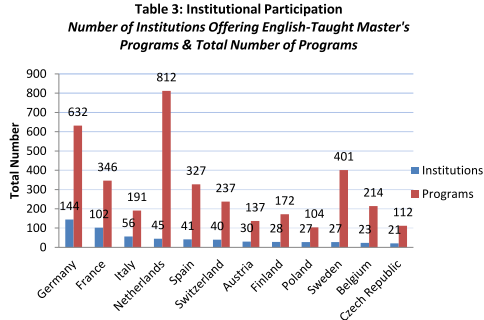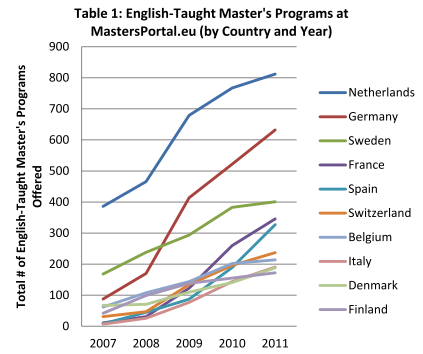English divides French education

France’s National Assembly is discussing plans to change the law that obliges all teachers to teach in French, from kindergarten to university. By relaxing the law the French hope to attract more international students, but the idea is heavily opposed by a politicians and teachers that fear that France will lose its cultural identity.
Five people discussing Proust
Geneviève Fioraso, the French Minister of Higher Education started the debate because she is afraid that France is being left behind in the international ‘battle for brains’. She fears that French universities end up as places where “five people sit around a table discussing Proust”. Higher education has to open up says Fioraso and the language barrier makes it hard to attract foreign students, teachers and start joint-degree programs with universities from other countries.
Even with the strict rules, around 400 master’s programs and 790 training courses are offered in English. The survey English Taught Master’s in Europe 2012 showed that only Germany currently has more universities that offer courses in English, however the number of courses is relatively low. In Germany the number has risen from 88 in 2007 to 632. The number of English courses offered by Dutch universities has more than doubled since 2007 to over 800.

Trying to attract the best
The number of English courses has risen steeply since the start of the Bologna process. More students prefer English programs to increase their mobility and to get access to top-quality international teaching and research material. The proposed change in legislature is supported by a group of world-class researchers, including Nobel prize winner Francoise Barre-Sinoussi, who discovered the HIV-virus.
The education unions strongly oppose and threatened with a strike, they believe that France’s cultural heritage is at stake. The Academie Française fears the marginalization of the French language, not only in France but also in Francophone Africa. Fioraso disagrees and points out that France recently has dropped from the third to the fifth place on the ranking of most attractive countries for higher education. Fioraso adds that especially the most talented students seek alternatives for France.
President Hollande hopes by changing the law to attract more foreign students and help French graduates to compete in a global economy as the country struggles to regain competitiveness. Youth unemployment lies at 25 percent and the number of young people that work and study abroad has risen since the start of the economic crisis.
Meest Gelezen
‘Free riding brengt het hoger onderwijs in de problemen’
Vrouwen houden universiteit draaiende, maar krijgen daarvoor geen waardering
Hbo-docent wil wel rolmodel zijn, maar niet eigen moreel kompas opdringen
‘Sluijsmans et al. slaan de plank volledig mis’
Aangepast wetsvoorstel internationalisering dient vooral samenleving in plaats van student

